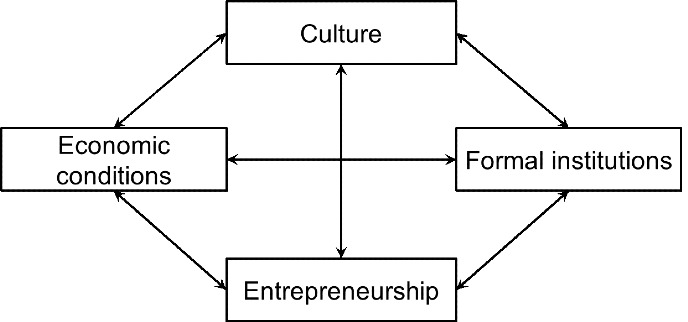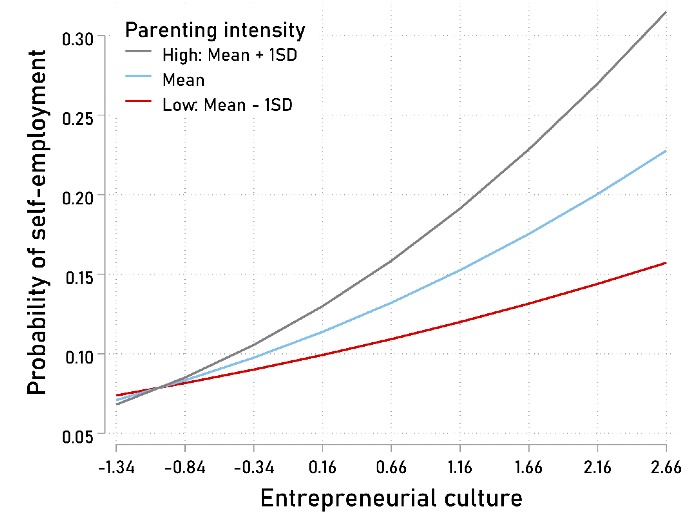New insights into the deep cultural roots of entrepreneurship

Second-generation immigrants are more likely to become entrepreneurs if their parents originate from countries characterized by a strong entrepreneurial culture than second-generation immigrants whose parents stem from countries characterized by a weak entrepreneurial culture. This is what new research by Johannes Kleinhempel, Mariko J. Klasing and Sjoerd Beugelsdijk argues. Their study was recently published in Organization Science. In this blog, the authors will give a summary of their most important findings.
For more than a century, scholars have argued that culture influences entrepreneurship. However, empirical research has produced mixed and conflicting findings. It has traditionally been difficult to isolate the effect of culture on entrepreneurship since entrepreneurship and the economic, formal institutional, and cultural characteristics of countries are deeply intertwined. For example, culture influences economic development (as Max Weber’s thesis of the ‘Protestant work ethic’ also argues), but economic development also leads to changes in culture (as the ‘modernization theory’ argues). Culture, formal institutions, and economic development influence each other reciprocally and vary simultaneously across countries (see Figure 1) which makes it difficult to zoom in on the role of culture in entrepreneurship.

Tackling empirical challenges
“To tackle this theoretical and empirical challenge, to isolate the role of national culture from other country-specific characteristics, we use a new empirical strategy of studying second-generation immigrants”, says Kleinhempel. The researcher, who is currently a postdoc at Copenhagen Business School and obtained his PhD at UG’s Faculty of Economics and Business (FEB), continues: “On the one hand, since culture is durable, portable, and passed on from generation to generation, second-generation immigrants of different ancestries may differ in their inclination for entrepreneurship - as partially influenced by their country-of-ancestry culture. Yet on the other hand, because second-generation immigrants were born, raised, and live in the same country, we can hold the role of the economic and institutional factors in entrepreneurship constant.”
Using two independent samples - 65,323 second-generation immigrants of 52 different ancestries in the United States and 4,165 second-generation immigrants of 31 ancestries in Europe - the researchers find that country-of-ancestry entrepreneurial culture is positively associated with the likelihood that second-generation immigrants are entrepreneurs. They also show that their findings are robust to alternative non-cultural explanations, such as financial resources, labor market discrimination, skills, and direct parent-child linkages.
The researchers further find that second-generation immigrants in the United States are more likely to be self-employed if second-generation immigrants of the same ancestry who were born and live in Europe exhibit a higher propensity for entrepreneurship - and vice versa. This lends further support to the hypothesis that culture influences entrepreneurship, since the only commonality shared by second-generation immigrants who were born in the United States and in Europe is the country of origin of their parents.
Intergenerational cultural transmission
Kleinhempel, Klasing, and Beugelsdijk then highlight the critical role of intergenerational cultural transmission (see Figure 2). “Our findings show that the relation between country-of-ancestry entrepreneurial culture and the likelihood that second-generation immigrants are entrepreneurs is also strengthened by parenting intensity, meaning how much time parents spend with their children, since more intense parent-child interactions facilitate cultural learning,” says Klasing, who is an associate professor at FEB’s department of Global Economics and Management.

The study resolves the prior mixed empirical findings by underscoring the likely causal role of culture in entrepreneurship. “National culture is a deeply rooted determinant of entrepreneurship and national cultural imprints are durable, portable, and intergenerationally transmitted such that they persist over at least two generations and in different economic and institutional contexts,” adds Sjoerd Beugelsdijk, Professor of International Business at FEB.
Considering the cultural context
The authors’ findings point to culture as being one of the deeply rooted drivers of the observed large and enduring differences in entrepreneurial performance across countries. This matters because entrepreneurship is an important driver of innovation, job creation, and economic dynamism, such that the cross-country differences in entrepreneurship have important implications for national economic performance.
With their research findings, Kleinhempel, Klasing and Beugelsdijk highlight that policymakers need to consider the cultural context when designing entrepreneurship promotion strategies. Typically, entrepreneurship promotion programs have focused largely on improving the economic and formal institutional conditions for entrepreneurship, like making finance more accessible and eliminating excessive bureaucracy. The efficiency of these measures likely depends on the prevailing cultural norms in values. For example, in countries with low levels of entrepreneurial culture, the first step of entrepreneurship promotion programs should be to promote entrepreneurship as a legitimate and desirable endeavor, an issue that is less salient in countries that already exhibit high levels of entrepreneurial culture.
“We show that second-generation immigrants who were born, raised, and educated within the same country and face the same economic and institutional circumstances are more likely to be entrepreneurs if their parents stem from countries characterized by a strong entrepreneurial culture rather than a weak entrepreneurial culture - entrepreneurship has deep cultural roots”, concludes Kleinhempel.
More information:
Kleinhempel, J., Klasing, M. J., Beugelsdijk, S. (2022). Cultural Roots of Entrepreneurship: Evidence from Second-Generation Immigrants. Organization Science. https://doi.org/10.1287/orsc.2022.1645.
Questions? Please contact Mariko Klasing or Sjoerd Beugelsdijk.

